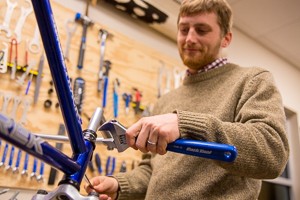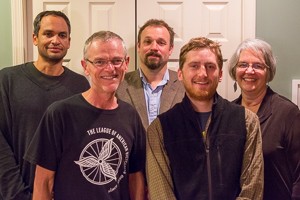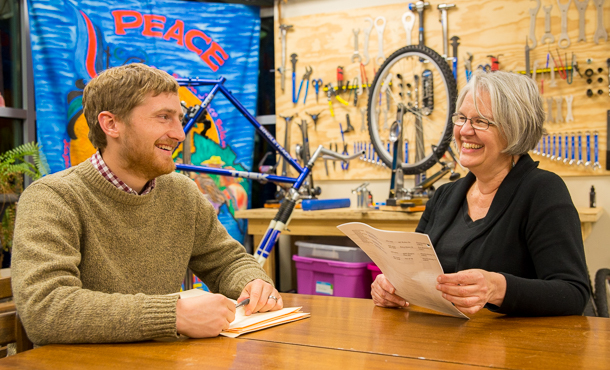Witness this office meeting space turn into something different, a bit like Bruce Wayne’s Bat Cave: The wide boardroom table slides out of the way, the wall tapestries roll up to reveal pegboards filled with bicycle repair tools. Suddenly, a bike shop is born. But this isn’t just any bike shop. It’s a bike shop with a mission, as befits the people and their values who use the administrative space during the day.
You’ll find this magical re-tooled space in the administrative offices of Gift & Thrift, a Harrisonburg thrift store whose proceeds support the Mennonite Central Committee (MCC).
The (L)earn-a-Bike program was founded this past year by a contingent of Eastern Mennonite University alumni and campus community members as an alternative means for juvenile offenders to serve court-appointed community service hours.

Ben Bailey ’12, who co-founded the program with Gift & Thrift manager Deb King ‘77, describes its simple, but powerful premise: The teenagers—most are middle- and high-school-aged—are given a used, donated bicycle. They then strip all tparts from its frame and put them in a basket. In two-hour increments over the next eight weeks, under the guidance of an instructor, the kids service the parts and rebuild the bicycle, which they are allowed to keep once they have completed the course.
Yes, it might seem simple, but in the steps of rebuilding a bicycle arise opportunities for challenge, frustration and collaboration – the process nurtures personal growth.
“The kids that come through our program are often those who haven’t found success in the traditional classroom setting,” said Bailey.
He sees (L)earn-a-Bike as a safe space where participants can explore different kinds of learning, build self-confidence and experience the mentorship of positive role-modeling.
“This is a place where whoever comes can step into positivity,” said Bailey.
And then there is the work itself. Tom Brenneman ‘92 was working as an early intervention officer with the Rockingham County courts when he began the conversation about a bicycle-related community service program based on his experience with similar programs, such as the Zuni Avenue Bike Club in Tucson, Arizona. Brenneman thinks there is a tremendous amount of healing to be found in such tangible, hands-on work.
The program is young; the first participant began coursework in May 2015 and graduated in June. With 22 teenagers already having completed the program since then, and plans of having engaged 40 youth by June 2016, the community impacts could be significant.
“Wrenches, grease, gears and a spirit of welcome,” Brenneman said when describing the program. “It’s like Zen and the Art of Motorcycle Maintenance for kids.” [For those who aren’t familiar with this influential work of philosophy, Zen and the Art of Motorcycle Maintenance, published in 1974 by Robert M. Pirsig, explores, through a father-son trip on a temperamental motorcycle, the themes of work, values and the analytic/creative ways of thinking.)
Riding together
Gift & Thrift may not seem like the obvious place for a program like (L)earn-a-Bike to set up shop, but King, who oversees all the charitable operations housed in the Park View shopping center close to the EMU campus, sees (L)earn-a-Bike slotting neatly into the non-profit’s mission. The thrift store has a long history of hosting young people and adults looking for a place to complete court-mandated volunteer hours.
“We had been having conversations among ourselves and with people in the community regarding how to better utilize what we have going here,” said King. “We know that we offer informal mentoring and training when volunteers come to work for us. But what would it look like if we were to formalize that experience, gear it toward a specific segment of the population, and focus on a tangible skill set, all the while offering a safe setting where healthy relationships are nurtured?”
With that vision, (L)earn-a-Bike has partnered with the Department of Juvenile Justice (DJJ) through the Virginia Juvenile Community Crime Control Act (VJCCCA), a grant-funded program aimed at stemming the tide of youth falling into the juvenile detention system through a focus on community service- based sentencing. Celeste Williams, who oversees the VJCCCA in Harrisonburg, said the excitement about such programs is palpable.

“Kids who went through this program reported having learned more about themselves, and felt more proud of themselves than those who filled more traditional community service roles,” she said, adding that the potential for programs such as (L)earn-a-Bike is exponential. “We don’t need much money to start programs like this. We just need a few excited people.”
EMU has been a source of several of those people. Bailey, the office coordinator for the applied social sciences department, is an active cyclist and advisor to the EMU Cycling Club. Eric Saner, husband of Bible and religion professor Andrea Saner, serves as an instructor (community member Matt Hassman also instructs). The program’s advisory team is comprised of Bailey, King, Brenneman, student Matt Swartzendruber, Nathan Zook Barge ‘84, MA (conflict transformation) ’99, and professor of Bible and religion Peter Dula ’92.
Contributions helpful
The group continues to explore funding options. While (L)earn-a-Bike receives funding from the DJJ for each participant who completes the course, the amount remains inadequate to provide quality programming, so charitable contributions currently bridge the budgetary gap. Community Mennonite Church, the Voluntary Gas Tax, and local individuals have thus far made donations. [Information about how to contribute is at the end of this article.]
Other non-monetary contributions have been just as valuable to the program’s success. Local business Pro Tested Gear has donated a wide range of quality bike parts they weren’t able to sell through their EBay site. The City of Harrisonburg provided a grant to purchase tools, and Byler Barns will soon be delivering a donated barn.
“Storing our inventory has been a problem,” said Bailey, “so we’re really looking forward to having space outside of our workshop.”
The goal, Bailey notes, is to create a program that sustains itself through services provided the community—like bicycle classes offered to the public. So eventually the best way to support (L)earn-a-Bike will be by enrolling in a class.
Pedaling forward
Bailey says the program is gaining traction in the community and local courts, with several teens who had stolen bicycles being appointed directly to (L)earn-a-Bike by the judge overseeing their cases. But he envisions the program as more than a place to fulfill community service requirements.
“I won’t be satisfied until we have a space that’s open to everyone,” he said, citing an increasing interest and demand for affordable bicycles throughout the area.
King agrees. “We see this program ultimately as a destination for getting people together to be a community together,” she said. “By leveraging the non-profit service model that Gift & Thrift provides, we hope to be able to meet tangible goods and service needs in a way that’s accessible to people on the margins.”
For the moment, though, Bailey and King are focused on building a creative and compelling alternative for court-appointed volunteers, one in which the hard work of self-reflection and tangible reward of a job well-done go hand in hand. As Brenneman noted, “That’s a good start to restorative justice on two wheels.”
To contribute
Contact Deb King at 540-746-8547, ext. 103, or mail checks made out to Gift & Thrift with “(L)earn a Bike program” in the memo line.

Keep up the great work
P